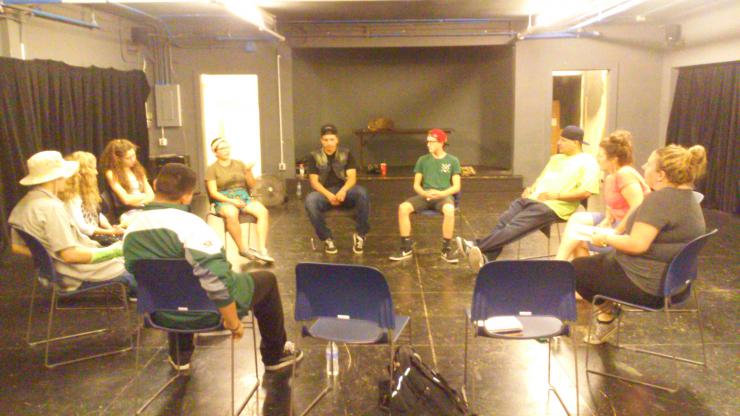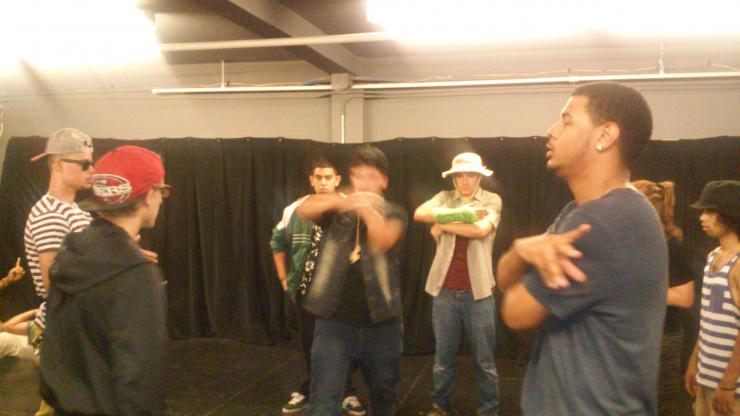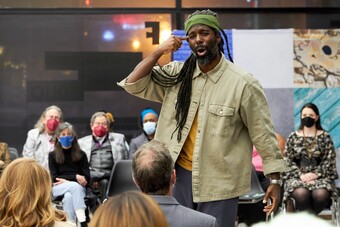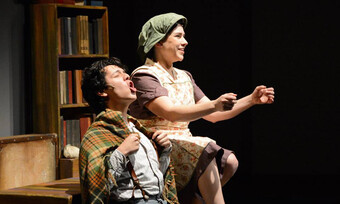Respecting Hip Hop in Rising Youth Theatre’s production of antonia
a latina hip-hop Antigone
“Rap is something you do, Hip-Hop is something you live.”—KRS-One
The mission of Rising Youth Theatre is to create youth driven theatre that is not only riveting and relevant, but also challenges audiences to hear new stories, start conversations, and participate in their communities. Heading into their fifth year anniversary, Co-Artistic Directors Xanthia Angel Walker and Sarah Sullivan have successfully promoted these ideals with a number of diverse communities throughout Phoenix, Arizona.
Rising Youth’s programming has touched on several important issues affecting today’s youth, such as high school dropout rates, juvenile incarceration, the foster care system, and immigration. For the first show of its 2015/2016 season, the organization reached out to the youth of the hip-hop community. With every show Rising Youth produces, the creative team engages with youth in the community through story circle interviews that focus on the community’s relationship to the issue being explored. From this interaction the playwright involved creates a play. For the first show of the season, the resulting project was an adaptation of a Sophocles’ play titled antonia: a latina hip-hop Antigone. Both the playwright and director felt that the themes in the play, such as power, fate vs. free will, rules vs. order, and feminism vs. gender, were relatable to hip-hop culture and the lives of the youth participating in the project.
The success of a TYA hip-hop performance is dependent on a communal form of dramaturgy that is similar to hip-hop’s cypher, or artistic gathering.

In the process of creating antonia, Rising Youth has made a conscious effort to respect hip-hop culture by avoiding the appropriation of hip-hop, which is present in numerous productions of theatre for young audience (TYA) across the United States. This cultural appropriation has manifested in hip-hop theatre, lending itself to bad and disingenuous theatrical experiences. The danger of unauthentic hip-hop theatre is that it is a false reflection of what hip-hop is and works towards keeping the culture marginalized. Expanding on this sentiment, Rising Youth’s goal with antonia is to create theatre that explores hip-hop and its origins. Director Xanthia Angel Walker states, “In the field of TYA, I have observed ‘hip-hop’ being inserted into plays as a trendy way of being ‘accessible’ to young people. There is little to no regard for the elements and principles of hip-hop that serve as a powerful community building tool and emancipatory force. This force is often disregarded and disrespected in ways that continually feed the dominant narrative of the Caucasian, middle class youth experience.”
With this production of antonia, Rising Youth decided to perform the piece in a public space, which promotes the idea of making theatre accessible to those who have little to no knowledge of theatre and/or hip-hop by creating a gathering space where audiences participate in a “Block Party” setting. As a result, Rising Youth breaks away from the traditional proscenium stage, while paying homage to the origins of hip-hop culture by mimicking the “battles” that occurred on the streets in the early 1970’s in The Boogie Down Bronx. Therefore, creating a community space where ritual becomes the driving force. The audience does not only watch a play, but also participates in an experience.

I recommend that TYA theatres take note of Rising Youth’s process to mitigate the risks of creating unauthentic hip-hop theatre. I believe antonia models how to effectively and ethically create and produce hip-hop theatre. Three factors needed for producing hip-hop theatre are partnerships, dramaturgy, and community.
For antonia, Rising Youth is partnering with CYPHERS the Center for Urban Arts, founded by Danny “Skooby” Morales. This organization is dedicated to educating youth about the five elements of hip-hop: B-boying, MC-ing, DJ-ing, Graffiti Art, and Knowledge. This relationship was created with the understanding that CYPHERS offers an expertise of hip-hop culture that Rising Youth lacks. This partnership also ensures that the interests of youth participants are protected. Furthermore, the goal is to establish a common vocabulary that will allow both partners to benefit from the collaboration in a meaningful fashion, while educating each other in their respective mediums. TYA theatres wishing to produce hip-hop theatre should seek out partnerships with organizations that promote and maintain hip-hop culture. Without these types of partnerships, the risk of hip-hop culture being exploited on stage increases.
In the field of TYA, I have observed ‘hip-hop’ being inserted into plays as a trendy way of being ‘accessible’ to young people. There is little to no regard for the elements and principles of hip-hop that serve as a powerful community building tool and emancipatory force. —Xanthia Angel Walker
The approach to dramaturgy is another important factor in the production of hip-hop theatre. In antonia, Rising Youth focuses on how the themes in the original source material connect with the elements of hip-hop. The creative team includes a dramaturg and experts from multiple disciplines within the hip-hop community. TYA theatres must focus on dramaturgy that considers the interdisciplinary nature of hip-hop and its improvisational foundation. Dramaturgy should not focus on one element, but rather all elements of hip-hop. This essentially calls for a creative collaboration and exchange of ideas that goes beyond the formal director-dramaturg relationship. The success of a TYA hip-hop performance is dependent on a communal form of dramaturgy that is similar to hip-hop’s cypher, or artistic gathering.
Lastly, acknowledging the importance of community members is key in the process because the hip-hop community continually gets misrepresented. This directive serves the production of antonia quite well, but should be a goal for any TYA theatre wishing to reach wider audiences like traditionally marginalized groups. Rising Youth holds itself accountable to the community-at-large. It does not produce a script of which community participants do not approve. This theatre believes that the community of youth will directly shape the content of its work. Rising Youth hopes to create art that converses with community members, instead of talking down to them. In regards to hip-hop culture, TYA theatres must evaluate how they approach this culturally sensitive subject. TYA theatres must also acknowledge that they have a moral obligation to do so.













Comments
The article is just the start of the conversation—we want to know what you think about this subject, too! HowlRound is a space for knowledge-sharing, and we welcome spirited, thoughtful, and on-topic dialogue. Find our full comments policy here
Awesome CC,
Thank You for this brotha, Salute to RYT
www.602cyphers.com
I'm honored to be a part of this production! I hope the word spreads quickly throughout the community. You are right Tiffany, it is time the story is told and CC is the man to do it, and do it right!
"In the process of creating antonia, Rising Youth has made a conscious effort to respect hip-hop culture by avoiding the appropriation of hip-hop, which is present in numerous productions of theatre for young audience (TYA) across the United States. This cultural appropriation has manifested in hip-hop theatre, lending itself to bad and disingenuous theatrical experiences. The danger of unauthentic hip-hop theatre is that it is a false reflection of what hip-hop is and works towards keeping the culture marginalized." Thank you for this, Jose. As the general manager of Hi-ARTS (formerly the Hip-Hop Theater Festival), I find it troublesome when I see hip-hop theatre co-oped to make theatre "cool" or "relevant". There is a history that needs to be acknowledged and respected. Rapping onstage does not constitute hip-hop. Hip-Hop is one of the most perfect vehicles for youth today because it was an artistic movement created by the youth to express the daily struggles they were experiencing. I hope that many other theatre companies read this article and recognize that there are artists and organizations that are masters of this art form. If they want to produce a hip-hop show, first approach the people that do this kind of work every day.
thank you for the kind words, tiffany. I feel honored to be a resident playwright with rising youth theatre. the respect they have for community is amazing and it is ingrained in every project they produce!